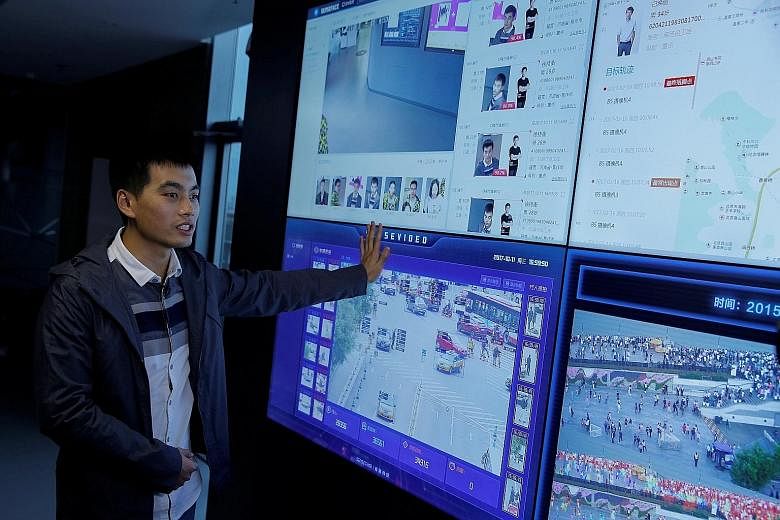BEIJING • SenseTime Group has raised US$600 million (S$787 million) from Alibaba Group Holding, Temasek Holdings and other investors at a valuation of more than US$3 billion (S$4 billion), becoming the world's most valuable artificial intelligence (AI) start-up.
The company, which specialises in systems that analyse faces and images on an enormous scale, said it closed a Series C round in recent months in which retailer Suning.com also participated. SenseTime did not outline individual investments, but Alibaba was said to have sought the biggest stake in the three-year-old start-up.
With the deal, SenseTime has doubled its valuation in a few months. Backed by Qualcomm, it underscores its status as one of a crop of home-grown firms spearheading Beijing's ambition to become the leader in AI by 2030.
And it is a contributor to the world's biggest system of surveillance: If you have ever been photographed with a China-made phone or walked the streets of a Chinese city, chances are your face has been digitally crunched by SenseTime software built into more than 100 million mobile devices.
The latest financing will bankroll investments in parallel fields such as autonomous driving and augmented reality, cover the growing cost of AI talent and shore up its computing power.
It is developing a service code-named Viper to parse data from thousands of live camera feeds - a platform it hopes will prove invaluable in mass surveillance. And it is already in talks to raise another round of funds and targeting a valuation of over US$4.5 billion, according to people familiar with the matter.
"We're going to explore several new strategic directions and that's why we shall spend more money on building infrastructure," SenseTime co-founder Xu Li said in an interview.
The company turned profitable last year and wants to grow its workforce by a third to 2,000 by the end of this year.
"For the past three years, the average revenue growth has been 400 per cent," said Dr Xu.
Alibaba could help with its enormous infrastructure needs. SenseTime plans to build at least five supercomputers in top-tier cities over the coming year to drive Viper and other services. As envisioned, it streams thousands of live feeds into a single system that are automatically processed and tagged, via devices from office face-scanners to ATMs to traffic cameras. The ultimate goal is to juggle 100,000 feeds simultaneously.
Police can use Viper to track everything from vice and accidents to suspects on blacklists.
While civil libertarians say such systems have been used to track activists and oppress minorities in places like the western region of Xinjiang, Dr Xu believes the technology is essential and deployed in various ways by the authorities around the world.
China's police forces and surveillance footage are also important sources of training data for SenseTime's image recognition systems - it claims to work with 40 city authorities in the country. "It will not affect privacy because only authorised persons can access it," he said.
SenseTime claims to have some 400 clients and partners, including Qualcomm, chipmaker Nvidia Corp and smartphone maker Xiaomi.
For this year, it is projecting several billion yuan in revenues, Dr Xu said. The start-up is expanding its reach across augmented reality, popularised by services like Snapchat that impose digital stickers and images on the real world. And it is working with Honda Motor to develop autonomous driving systems and is in talks to work with health institutions.
BLOOMBERG

